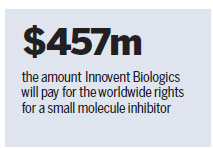Innovent strikes global rights deal for molecule tech
Leading Chinese biopharmaceutical company Innovent Biologics is now on the move, after announcing a landmark deal on the potential cancer therapy front that has global implications.
In early September, the company said it would pay $457 million to the Shanghai Institute of Organic Chemistry at the Chinese Academy of Sciences.
Under the terms of the deal, the company is acquiring the worldwide rights for a small molecule inhibitor of indoleamine 2,3-dioxygenase, also known as IDO.
By inhibiting IDO, pharma companies are aiming to restore the responses of the immune system - enabling cancer cells to be more readily identified and subsequently destroyed.
The institute is to get a total of $457 million in a combination of upfront and milestone payments, which Innovent said is the biggest amount ever paid to an academic institution under a Chinese industry deal.
The institute is also eligible for royalties.

The magnitude of the deal has ensured that the agreement has captured widespread attention from the industry.
Innovent plans to pair the IDO inhibitor with its PD-1 candidate, IBI308, both used in cancer immunotherapy, according to BioCentury, an industrial publication headquartered in the United States.
The IDO inhibitor is potentially complementary to the innovative antibody PD-1.
Their combination has promising curative effects, Innovent Chairman Yu Dechao told the Chinese media.
"The partnership will not only yield a more effective treatment - which will benefit patients in China and other parts of the world - but also advance Chinese biopharmaceuticals' expansion into international markets and help to promote the China-innovation brand in the industry worldwide," Yu said.
Wang Zhaoyin, a researcher at the Interdisciplinary Research Center on Biology and Chemistry, said research had found "over-expression" of IDO in multiple types of tumor cells, including those in the prostate, pancreas, breast and stomach, which was one of the reasons for the difficulties in detecting early-stage cancer.
The center is an affiliate of the Shanghai Institute of Organic Chemistry.
As tumor cells produce excessive IDO, they prevent the activation of a proliferation of immune cells.
As a result, the IDO over-expression enables tumor cells to escape the monitoring of the immune system, industry insiders said.
Wang and his colleague Zhu Yindong - as well as their research teams - developed the inhibitor, which curbs the over-expression and helps the immune cells to become reactive.
The researchers filed Chinese and foreign patent applications for the invention in around 2015, China Intellectual Property News reported.
For other Chinese pharmas, the collaboration model in this case is worth noting as a reference to learn from, Huang Renmin, a partner of Lecome Intellectual Property Agent, told the Beijing-headquartered newspaper.
She said that considering the enormous costs - as well as the prolonged timescale and high failure risks in research and development in the industry - Innovent Biologics' combined payment method enabled both parties to share the risks and benefits.
The attorney has focused on patent filings and IP protection in the biopharmaceuticals sector.
She noted that although milestone payments were more often found in the engineering sector, its use in drug R&D was beneficial to both investors and researchers.
Investors have to face considerable unmanageable risks for a prolonged period, which can take years, from medical research in a lab to rolling the finished product onto the market.
That is due to huge investments and concerns over multiple and stringent administrative approvals. The milestone payment helps to reduce the risks, Huang said.
For researchers, the payment method enables them to secure sufficient R&D funds at the early stage to sustain the project and reduce risks.
Otherwise they couldn't profit until their research proves to be a success, or might give up due to a shortage of funds, she added.
The Suzhou-based drugmaker has made the headlines before on the cancer therapy front.
Along with US group Eli Lilly and Company, a global pharma giant headquartered in Indiana, it agreed to milestone payments in a $1 billion deal to co-develop three bispecific antibodies for cancer treatment in 2015.
(China Daily 09/21/2017 page17)














